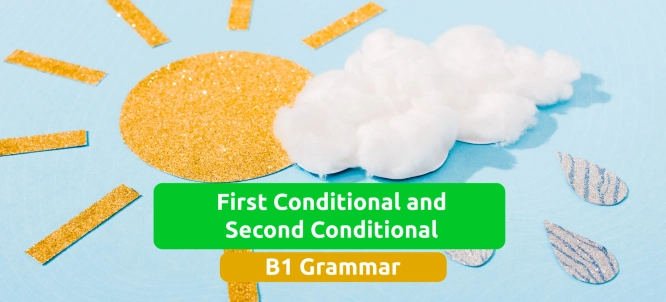by PushtoLearn
First Conditional and Second Conditional
Table of Contents
First and Second Conditional Exercises
These exercises focus on First and Second Conditional
What Are Conditionals?
Conditionals are sentences with two parts:
-
If clause: Explains a condition.
-
Main clause: Explains the result if the condition happens.

First Conditional: Real Situations
The first conditional is used to talk about real and possible situations in the future. The condition could actually happen, and the result is realistic.
Structure
|
Part |
Structure |
Example |
|
If clause |
If + present simple |
If it rains, |
|
Main clause |
will + base verb |
we will stay home. |
Examples
-
If I study hard, I will pass the test.
-
If you call her, she will come.
-
If they leave now, they will catch the train.
Everyday Use
We use the first conditional for plans, warnings, or promises:
-
Plans: If I finish work early, I’ll go to the gym.
-
Warnings: If you touch the stove, you will burn your hand.
-
Promises: If you help me, I will buy you ice cream.
Second Conditional: Unreal Situations
The second conditional is used to talk about hypothetical or unlikely situations in the present or future. The condition is not real or very unlikely.
Structure
|
Part |
Structure |
Example |
|
If clause |
If + past simple |
If I won the lottery, |
|
Main clause |
would + base verb |
I would buy a mansion. |
Examples
-
If I were rich, I would travel the world.
-
If she knew the answer, she would tell us.
-
If we had a car, we would drive to the beach.
Everyday Use
We use the second conditional to express dreams, advice, or regrets:
-
Dreams: If I could fly, I would visit every country.
-
Advice: If I were you, I would apologize.
-
Regrets: If he studied harder, he would pass the exam.
Key Differences Between First and Second Conditionals
|
Feature |
First Conditional |
Second Conditional |
|
Situation |
Real and possible |
Unreal or hypothetical |
|
Time |
Future |
Present or future |
|
Verb in If clause |
Present simple |
Past simple |
|
Verb in Main clause |
Will + base verb |
Would + base verb |
|
Example |
If it rains, I will stay home. |
If it rained, I would stay home. |
Common Errors
1. Mixing Verb Forms
Incorrect: If I will study, I will pass.
Correct: If I study, I will pass. (First conditional)
Incorrect: If I was rich, I would travel.
Correct: If I were rich, I would travel. (Second conditional; use "were" for all subjects.)
2. Using Would in Both Clauses
Incorrect: If I would see her, I would talk to her.
Correct: If I saw her, I would talk to her.
3. Confusing Real and Unreal
Incorrect: If I win the lottery, I would buy a car.
Correct: If I win the lottery, I will buy a car. (First conditional, because winning is possible.)
FAQ
Can I use "should" in conditionals?
Yes, in some cases: If you should need help, call me.
Why use "were" instead of "was" in the second conditional?
"Were" is correct for all subjects in formal English to show the situation is unreal. Example: If I were you, I would wait.
Can I use "could" in the main clause?
Yes, to express ability: If I studied, I could pass the exam.
Is the second conditional only for dreams?
No, it’s also for advice and regrets: If he were nicer, people would like him.
What about "if not"?
You can use "unless": I will go unless it rains. (Same as: If it doesn’t rain, I will go.)

